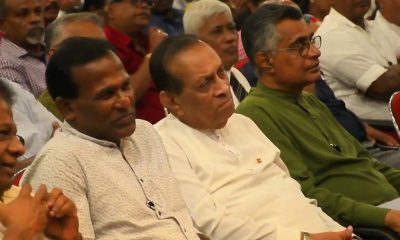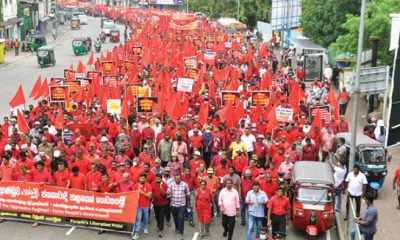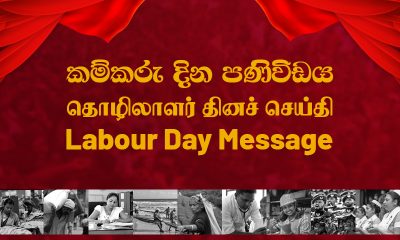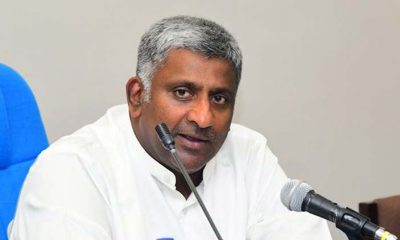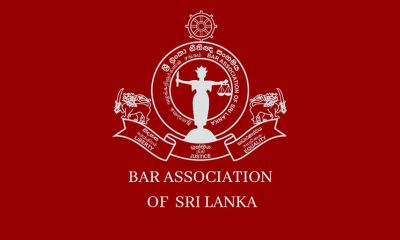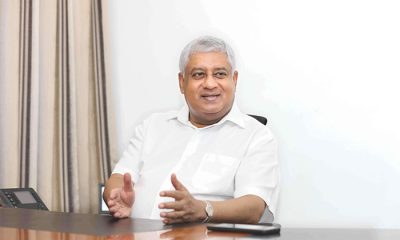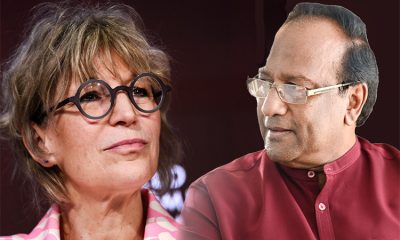Features
May Day: Further splits surface, combined attack on JVP while MR issues warning
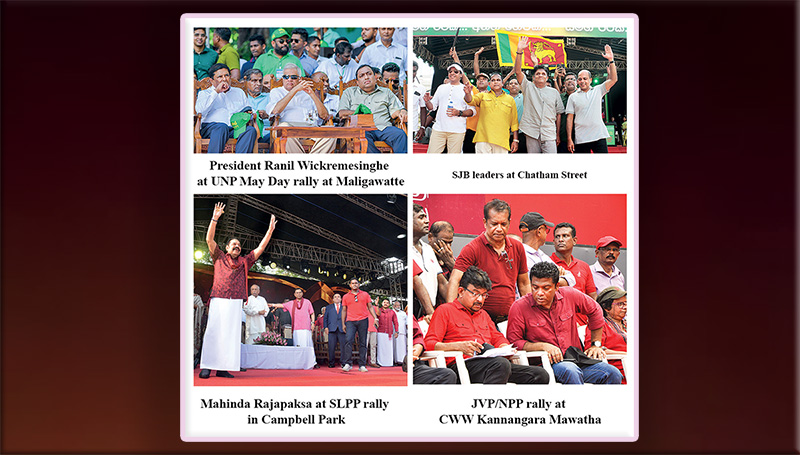
UNP delays official announcement on RW’s candidature as Namal presses for an opportunity
By Shamindra Ferdinando
In spite of determined UNP’s efforts, the party couldn’t convince SJB MPs to switch their allegiance to President Ranil Wickremesinghe in time for this year’s May Day rally chaired by the green leader at Maligawatte, the main Opposition party said.
Gampaha District SJB parliamentarian Kavinda Jayawardena told The Sunday Island that regardless of the UNP’s repeated invitations, the party was sure none in its parliamentary group would join President Wickremesinghe in the run-up to the presidential poll.
UNP General Secretary Palitha Range Bandara, on several occasions, invited the SJB which broke awa from the UNP before the last election to extend their support to Wickremesinghe, thereby strengthening his party ahead of crucial national elections.
SJB MP Nalin Bandara thumbed his nose at the UNP General Secretary over their failure to win over members of the main Opposition party. Addressing the SJB May Day rally at Chatham Street, the former UNP State Minister asked the UNP General Secretary what went wrong with their plans.
The UNP had to be happy with just Moneragala District SLPP MP Gayeshan Nawanandana who switched his allegiance to their side. Interestingly, Nawanandana, a first-time entrant to parliament contested the last general election with veteran politician Vasudeva Nanayakkara’s blessings.
The UNP’s decision not to officially announce Ranil Wickremesinghe candidature at the forthcoming presidential election at its Maligawatte May Day rally raised many eyebrows. The Opposition is going to drum-up this issue in the coming days. However, Minister Harin Fernando and former Minister Akila Viraj Kariyawasam referred to the forthcoming presidential election with the latter acknowledging the continuing disagreement between the UNP and the SLPP regarding Wickremesinghe’s candidature.
Kariyawasam, who with all his fellow UNP MPs failed to retain his Kurunegala district seat at the last election proudly declared that disgraced Health Minister Keheliya Rambukwelle being behind bars was a Wickremesinghe achievement.
Both the UNP and SJB held rallies on streets, packing participants into long narrow spaces, thereby constraining participation while the SLPP gathered at Campbell Park where former President Mahinda Rajapakasa declared that the outcome of the presidential election depended on SLPP support for the winner. The twice president and ousted premier warned that no one could win unless he/she reached a consensus with the pohottuwa. On stage with MR were Premier Dinesh Gunawardena, Basil Rajapaksa and new National Organizer Namal Rajapaksa widely believed to be the choice of an influential section of the SLPP to contest the presidential poll unless an agreement could be reach with Wickremesinghe to call early parliamentary polls.
Hence MP Namal Rajapaksa’s questioning at the May Day rally what he called “short-term decisions” should be examined in the context of his presidential ambitions. Interestingly, among those on the front row of the SLPP rally was businessman Dhammika Perera, MP, in his trademark blue suit and red tie in contrast to other informally clad participants. Perera has been repeatedly mentioned as a possible presidential candidate in case ongoing talks between Wickremesinghe and Basil Rajapaksa fail.
The SJB secured 54 seats, including seven National List slots, the second largest group elected at the last parliamentary polls in August 2020, whereas the parent UNP was able to scrape just one National List seat.
MP Jayawardena said that as the UNP hadn’t been so far able to propose a tangible plan of action to overcome the continuing economic/political/social crisis, it couldn’t expect political parties to extend their support to the UNP leader.
Two SJB MPs, Manusha Nanayakkara and Harin Fernando, during Ranil Wickremesinghe’s tenure as premier, joined the government in May 2022. But since he became president in July 2023, no SJB MP switched his or her allegiance to RW. However, the absence of Dr. Rajitha Senaratne and Thalatha Atukorale, both ex-ministers was noted while SJB Chairman Field Marshal Sarath Fonseka, MP, who has been in loggerheads with Sajith Premadasa left the venue before the conclusion of the day’s proceedings. Reportedly Fonseka had not been given a speech.
On Wednesday morning, the president joined the Ceylon Workers Congress, widely regarded as the strongest trade union/political party among plantation workers, at its May Day rally at the Kotagala public grounds. The single largest political force representing the upcountry Tamils, the CWC now supports Wickremesinghe after quitting the ruling SLPP on whose ticket it ran at the last parliamentary election. Jeevan Thondaman represents the CWC in Wickremesinghe’s cabinet while Senthil Thondaman is the governor or the Eastern Province.
The Sunday Island learns that the CWC had been negotiating with the SJB but decided to go along with Wickremesinghe on the basis of the agreement on a Rs 1,700 minimum daily wage for plantation workers announced on their May Day platform on Wednesday.
Clearly, Wickremesinghe and Thondaman wrong-footed Premadasa, whose party in collaboration with Palani Digambaram, MP, organized a May Day rally at Talawakelle. Although former national cricket captain Arjuna Ranatunga’s appearance caught public attention, the declaration of Rs. 1,700 daily wage hogged the limelight.
The EPDP, represented in Cabinet by Jaffna District MP Douglas Devananda, joined the ruling SLPP’s rally at the Campbell Park. His spokesperson Nelson Edirisinghe told us that the party would support Wickremesinghe at the forthcoming presidential poll. He clarified that the EPDP contested the last parliamentary election on its own and won two seats in Jaffna and Vanni.
The ruling SLPP held its rally, minus some of its members, as well as key constituents of the original coalition. The SLPP that had won 145 parliamentary seats, including 17 National List places have lost nearly 30 MPs since the last general election. Of them, six led by former External Affairs Minister Prof. G. L. Peiris joined the SJB’s Colombo rally. Other members of Prof. Peiris’s group were Dilan Perera, Dr. Nalaka Godahewa, Wasantha Yapa Bandara, K.P.S. Kumarasiri and Dr. Upul Galappaththy.
Other original members of that group, including Matara District MP Dullas Alahapperuma who ran for president against Wickremesinghe in a parliamentary vote after Gotabaya’s resignation, hadn’t been able to reach a consensus regarding their future course of action, sources said. Therefore, they refrained from either joining any other political party or organizing an event of their own to mark May Day. That group included MPs Alahapperuma, Prof. Channa Jayasumana, Charitha Herath, Ratnapala Ratnasekera, Lalith Ellawela and Thilak Rajapaksha.
Patali Champika Ranawaka, who entered Parliament on the SJB ticket, didn’t organize a May Day event. A senior spokesman said that they were preparing for the convention of their party due shortly. Former Minister Ranawaka leads the Eksath Janaraja Peramuna that received the Election Commission’s recognition last year. Another elected member of the SJB to skip May Day was Kumara Welgama, leader of New Lanka Freedom Party.
The Wimal Weerawansa-led Uththara Lanka Sabhagaya (ULS), which is another active SLPP rebel group, held its rally at the Lalith Athulathmudali playground, Kirulapone. National Freedom Front (NFF) leader and former Minister Wimal Weerawansa chaired the meeting, in his capacity as the Chairman of the alliance comprising the Communist Party (represented by Dr. G. Weerasinghe and Weerasemana Weerasinhe, MP), Pivithuru Hela Urumaya of MP Udaya Gammanpila, Our Power of People Party of Ven. Atureliye Rathana, MP, in his capacity as the leader of Dharani Jathika Sabhawa. and civil society group Yuthukama (Gevindu Cumaratunga) joined the rally.
This party declared in unison at its May Day rally that it was the only grouping genuinely opposed to President Wickremesinghe’s agenda inimical to national interests. Addressing quite a significant crowd, former minister Gammanpila found fault with ousted President Gotabaya Rajapakasa for ruining the mandate received by him as a result of caving into US interventions. The outspoken lawmaker named US Ambassador Julie Chung and dual citizen Basil Rajapaksa as the two advisors who caused the President’s downfall.
Gampaha District MP Nimal Lanza’s ‘New Alliance,’ consisting of SLPP MPs, too, kept away from Campbell Park. That group has pledged its support to President Wickremesinghe but decided not to join the UNP rally until the official declaration of Wickremesinghe candidature. It was quite agitated by the UNP’s decision to further delay the official announcement.
State Minister Lasantha Alagiyawanna said that the majority of the SLFPers, who had been elected on the SLPP ticket, decided to keep away from May Day rallies. They included the majority of the 14-member SLFP group sitting in Parliament now.
MP Alagiyawanna said that a May Day meeting that had been organized in Gampaha by Maithripala Sirisena faction of the party was meant to boost the image of Justice Minister Dr. Wijeyadasa Rajapakshe, PC, whose appointment as Acting Chairman of the SLFP was restrained by a court order. Obviously, at the time MP Alagiyawanna talked to us he wasn’t aware of former President and SLFP leader Maithripala Sirisena’s declaration that Rajapakshe would be their (SLFP) presidential candidate. Sirisena too has been retrained from leading the SLFP by a court order.
Sirisena who left the SLFP’s Gampaha May Day rally to attend the commemoration ceremony of the late T.B. Ilangaratne in Colombo acknowledged that 11 of his MPs now served Wickremesinghe’s interests but he was able to win over a key member of the UNP leader’s cabinet.
The SLFP rally attended by only two MPs – Maithripala Sirisena and Dushmantha Mithrapala -attracted just a fraction of the crowds the party once attracted over the years. Minister Mahinda Amaraweera, another key member of the group opposed to Sirisena’s leadership, was out of the country. Minister Rajapakashe declared his readiness to take up the challenge to run for president and his right to do so at the Gampaha rally.
MP Dayasiri Jayasekera, once SLFP Secretary, said that he didn’t organize any event as a member of the SLFP but addressed a gathering organized by Prabha Ganeshan, a member of a political grouping recently set up by the SLFPer.
Both Wickremesinghe and Premadasa reiterated their commitment to the IMF package at their May Day rallies though Sajith vowed to renegotiate it. Wickremesinghe again sought SJB and JVP/NPP backing for the IMF program that had been repeatedly attacked by the Opposition.
But whatever the disagreements, the UNP, SLPP and SJB agreed on the need to counter the strong challenge mounted by the JVP/NPP. Their fire was mainly focused on the JVP’s second insurgency launched in the wake of Indo-Lanka Accord of July 1987 and the induction of the IPKF here to subdue the LTTE.
The JVP held four rallies, including one in Colombo, whereas two breakaway factions, the NFF and Peratugaami Pakshaya, addressed supporters separately. The NFF is a member of the ULS. JVP/NPP leader Anura Kumara Dissanayake declared that his party is confident of victory whatever national election is held first. What surprised many was AKD’s attack on Wickremesinghe over the latter’s dependence on India when he too is under fire for his own Indian links.
Another development that attracted public attention was Sagala Ratnayake addressing the UNP May Day rally in his capacity as the party’s National Organizer in spite of journalist Lasantha Ruhunuge, on behalf of the ‘Annidda’ newspaper, questioning the Election Commission as to how the President’s chief-of-staff, as a public servant, engaged in politics.
Features
‘Is India going to steal land, water and air?’

by Neville Ladduwahetty
The question cited above was the title of an article published in Ceylon Today by N. Sathya Moorthy (SM), who identifies himself as a Chennai based Policy Analyst/Political Commentator (Friday 10, 2024).The answer to his question is – NOT YET. For the present, stealing is limited to marine assets and the destruction of its habitat in the process by Indian fishermen. These practices have been going on for decades. By resorting to bottom trawling not only is the habitat destroyed for decades, but also the infrastructure of the Sri Lankan fishermen thus affecting their livelihoods. However, going by past and ongoing practices notwithstanding all the protests, expanding the scope of stealing to other fields of activity cannot be ruled out from opportunities arising from increased Connectivity.
STEALING MARINE RESOURCES
In a United Nations-Nippon Foundation of Japan Fellowship Programme of 2016, Aruna Maheepala claims: “There are over 5,000 mechanised trawlers in Tamil Nadu and nearly 2,500 of them enter Sri Lankan waters on Mondays, Wednesdays and Saturdays and often coming at 500 m of the shoreline (emphasis added) …. More than 50,000 marine fishers live in the northern fisheries districts of Sri Lanka (Jaffna, Kilinochchi, Mannar, Mullaitive), and they account for about one-fourth of the marine fishers of the country”.
“Before the commencement of the war (1982) around 40% of the fish production of the country came from Northern fishery districts (except Kilinochchi). However, contribution of the fish production in the northern fishery district drastically dropped to 5% in the peak period of the war (2008) and gradually increased after 2009. Livelihoods of Sri Lankan fishers’ have been drastically affected as a result of the Indian poaching” (Ibid).
Judging from the map of Sri Lanka’s EEC and its proximity to India’s coastline, to claim that Indian trawlers “drift” into Sri Lankan waters is unacceptable. On the contrary, the India trawlers “drift” into Sri Lankan waters because they have exhausted resources within India’s EEC.
In the context of the ground situation cited above, for Dr. Jaishankar’s claim that ‘India is committed to the wellbeing and progress of nations of the Indian Ocean is based on our Neighbourhood First’ is far from the truth. Instead, it sounds more like India First in the neighbourhood. To expect India to address this issue despite Dr. Jaishankar’s commitment to “a multilateral rules-based international order along with sincere respect for sovereignty and territorial integrity” are only words in the wind because it is alleged that the majority of Indian fishing boats entering Sri Lanka waters are connected to Indian politicians who are Members of the Legislative Assembly of Tamil Nadu.
This being the case, stealing marine resources and destroying their habitats is bound to continue without a word of ‘Thank you’ from Sathiya Moorthy or any others in India. In contrast, he expects Sri Lanka and its People to say ‘Thank you’ for the ‘ship-to-mouth assistance granted by India and Indians to the ‘People of Sri Lanka’, repeatedly referred to by External Affairs Minister, Jaishankar, not realising that the monetary value of what was and is being stolen and what is wantonly destroyed in the process, not to mention livelihoods of thousands, far outweighs the value of the assistance given. Therefore, there is no cause whatsoever to say ‘Thank you’.
IMPACT of CONNECTIVITY
With increased Connectivity through a Land Bridge, there is a strong possibility that Indians may Steal Sri Lankan jobs judging from the job situation in India, presented by Mr. Dharmawardana in “System Change: Is Sri Lanka to become an Indian Pradesh”? (The Island May 8, 2024). The article states that “some 93,000 candidates applied for 62 ‘peon’ posts in Uttar Pradesh police department which required a minimum eligibility of grade 5; However, there were 3,700 PhD holders and 28,000 post graduate and many graduates”. In such a background, there is a strong possibility for Indian applicants to offer their services at considerably reduced rates for employment in Sri Lanka, thus depriving Sri Lankans from gaining employment in their own country.
Commenting on the proposed “Massive Investments” in Sri Lanka by India, Sathiya Moorthy is of the view that there is a limit to what he calls a “good compromise in the name of environmental protection”, if “Sri Lanka and Sri Lankans should decide whether they want to live in stone-age caves or live in the times and with the times”.
If he thinks that these unsolicited Investments are being undertaken by India to ensure that Sri Lanka and Sri Lankans live with the times, he is being pedestrian in his thinking. Instead, it is all part of a fall-out arising from geopolitical rivalry by the QUAD to counter China’s influence in Sri Lanka; a fact evident when the US International Development Financial Corporation (DFC) agreed to fund the West Coast container terminal with a contribution of $533 to the Adani Group to build, as a Joint Venture with the Adani Group holding 51% of the shares and the rest, only 49% held by John Keels Holdings and Sri Lanka Ports Authority.
According to a Bloomburg report the Adani Group, the Indian ports-to-power conglomerate, is considering a $750 million investment in Sri Lanka to set up two wind projects that will generate 500 megawatts on the island as another component of extending Connectivity.
Continuing according to the report, Modi is seeking to tilt the balance in a strategic tussle with China on Sri Lanka, a pivotal battleground because it lies on key global shipping lanes and plays into India’s concern of encirclement from Beijing. New Delhi plans to boost air connectivity and also speed work on linking electricity grids with Sri Lanka. The two nations will also conduct a feasibility study for a petroleum pipeline as well as for a land bridge and passenger ferry service.
It is therefore, crystal clear that these Massive Investments are undertaken in the pursuit of the individual and collective national and geopolitical interests of the US and India and not for the benefit of Sri Lanka and Sri Lankans per se as Sathiya Moorthy contends, but only because Sri Lanka’s strategic location has imposed a degree of importance that needs to be controlled by the QUAD. In the light of these external compulsions Governments representing Sri Lanka’s interests have hard and limited choices.
Furthermore, since these are unsolicited Investments, relationships between and within governments factor in and invariably influence the negotiating processes involving costs and leniency towards environmental and other contractual obligations, etc. Consequently, client States such as Sri Lanka invariably end up with the short end of the stick. What is more surprising and disappointing is for a US Government Agency such as DFC to fund an unsolicited investment to the tune of US $533, thus violating good practices such as transparency associated with open bids.
SENSE of VULNERABILITY
The report cited above conveys the sense of vulnerability that has influenced India’s relationship with Sri Lanka. The need for Modi to tilt the balance in a strategic tussle with China on Sri Lanka, a pivotal battleground because it lies on key global shipping lanes and plays into India’s concern of encirclement from Beijing says it all. The sense of vulnerability felt by India regarding its security and territorial integrity is not new.
India’s leadership has repeated often enough, that the ‘security of India depends on the security of Sri Lanka’: a concern that causes India to seek regular assurances from Sri Lankan leaders and even prospective ones, that they would not undertake any ventures that have the potential to threaten India’s security. Such a perception has compelled India to adopt proactive measures to “tilt the balance in a strategic tussle with China on Sri Lanka”.
STRATEGIES to CONTROL DIRECTION of SRI LANKA
The way India is planning to “tilt the balance” in India’s favour is by adopting policies and strategies to CONTROL Sri Lanka’s political, financial and economic determinations in a direction that ensures India’s security and does not hinder India’s national and global aspirations.
POLITICAL CONTROL
For instance, control over internal political arrangement is through the repeated insistence of the full implementation of the 13th Amendment crafted and imposed by India. This entrapment is a serious fetter to the introduction of system changes at the Provincial level where powers Constitutionally devolved to Provinces are further devolved to Districts and Local Governments in a manner that enables development in the peripheries based on their respective determinations and capabilities. The strait jacket imposed by the 13th Amendment seriously restricts autochthonous development in the peripheries, thus affecting the livelihood of the majority in Sri Lanka.
FINANCIAL CONTROL
Financial control is through the use of the Indian Rupees in acquiring Assets, Trade through lines of credit and other transactions. For instance, the recent launch of the Unified Payments Interface (UPI) mechanism claims to reduce the cost of financial transactions between India and Sri Lanka. It is reported that Indian Government is actively exploring the possibility of facilitating Indian Rupee investments for Indian Companies in Sri Lanka.
“In the fiscal year 2023, the Reserve Bank of India (RBI)granted permission for international trade for invoicing and payments to be conducted in Indian Rupees. This move allowed for exports and imports to be denominated and invoiced in Rupees, with trade transactions settled in the currency. The RBI’s decision aims to stimulate global trade growth, particularly Indian exports, while also working towards the internationalisation of the Indian Rupee” (Ceylon Today, February 28, 2024).
“Last year, Sri Lanka officially recognised the Indian Rupee as a designated currency, ending trade settlements between the two countries to be conducted in Rupees” (Ibid).
“Currently, Indian Investors typically engage in investments in Sri Lanka using international currencies like the US Dollar, which involves additional complexities and conversion costs. The transition to Rupee investments is expected to streamline market entry for Indian companies, with the Ministry of External Affairs reportedly advocating for this transition” (Ibid).
The report finally states: “The push for Rupee investments aligns with India’s broader vision to elevate its currency to the status of hard currency in the future, potentially leading to inclusion in the IMF’s SDR basket and bolstering its foreign exchange reserves. This move is anticipated to benefit Indian firms with significant investments in Sri Lanka, such as the Adani Group’s development projects in the country’s port and power sector” (Ibid).
ECONOMIC CONTROL
Economic control is through unsolicited “Massive Investments”, that Sathiya Moorthy refers to in ports, renewable energy and other infrastructure projects to consolidate connectivity on lines cited above. Other actively pursued projects are the under-sea pipeline for petroleum products and for electricity grid connections together with the Land Bridge cited above. The collective impact of all this is not only to control the future direction of Sri Lanka but also constrain future choices open to Sri Lanka, in order to ensure a dependence that guarantees the security of India without depending on verbal assurances of Sri Lankan political leaders whatever their hue.
CONCLUSION
The answer to Sathiya Moorthy’s question “Is India Going to Steal Land, Water and Air?” is: NOT YET. For the present, stealing is limited to marine resources and the wanton destruction of its habitat within Sri Lanka’s Exclusive Economic Zone; a practice that has been going on for decades without acknowledgment of any kind – not even a Thank You. The stealing that is yet to come would be later, and would be through unsolicited projects judiciously selected and proposed by India in the name of Connectivity in order to control determinations of Sri Lanka in a manner that guarantees the security of India without depending on verbal assurances by Sri Lanka’s political leaders.
The reason for the obsession with security is because of a notion of vulnerability that India and its leadership has experienced for decades and repeated often, that the ‘security of India depends on the Security of Sri Lanka’. Although the sense of vulnerability brought about by a perception of encirclement had affected India for decades, the growing economic clout that India is experiencing in the background of geopolitical rivalries has emboldened India to adopt more proactive strategies to “tilt the balance in a strategic tussle with China on Sri Lanka”.
The strategy adopted guarantees security as far as Sri Lanka is concerned, is by being in a position to CONTROL determinations of Sri Lanka through Internal Political arrangements (13th Amendment), Financial through UPI and the role of the Indian Rupee in Trade and other transactions and Connectivity through Massive Investments in unsolicited infrastructure projects, investing in existing projects, resources and assets in order to colonize Sri Lanka and make it DEPENDENT on India. The policies currently being adopted by Sri Lanka are facilitating this process.
Features
Diana’s noisy exit; super women brings credit to Lanka and unwanted experts

 Finally, the case pertaining to State Minister Diana Gamage’s position as a British citizen has been brought to a close by a judgment of the Supreme Court. She has been dislodged from her National List post. Even her very continuance of living in Sri Lanka is unlawful, Cass surmises, for she does not even hold a visitor’s visa.
Finally, the case pertaining to State Minister Diana Gamage’s position as a British citizen has been brought to a close by a judgment of the Supreme Court. She has been dislodged from her National List post. Even her very continuance of living in Sri Lanka is unlawful, Cass surmises, for she does not even hold a visitor’s visa.
As an illegal resident of this country did Diana Gamage live mouse-like? No, not Defiant Diana! She roared like a lioness and even bared her claws like an enraged tigress in an argument with two co-MPs in the House of Reps on the Diyawanne.
Much was written about this anti-heroine in the Sunday newspapers of May 12. I quote from the Sunday Times: “After the highest court in the land gave its verdict, you were unrepentant and defiant. It was a bit puzzling when you said you ‘respected’ the judgment but saw there was a political conspiracy behind it. … Talking of conspiracies, the court did ask why the CID didn’t investigate your alleged offences for three years; and why you were so privileged. There seemed to be evidence of your obtaining several passports from the Paradise.”
That quote from a columnist who writes letters in a tongue in cheek manner but hits severely on truths of how Sri Lankan politicians and services function, opens up some issues. The judgment said that all must be treated equally before the law. It also focused the spotlight on persons obtaining several passports, DPL included. There is another flashy dame by the name of Sashi, who assumed more than one date of birth and hey presto, was the possessor of a diplomatic passport too!
What stuck in Cassandra’s throat chokingly over the defeated yet defiant Diana centered hoo-ha is her remark at a press briefing quoted by another columnist of the Sunday Times: “Why should I go from this country? I am a full-blooded Sri Lankan, with generations of Sinhala blood in me …” For that remark alone, Cass pronounces Diana Gamage with her British passport, not even having sought dual citizenship, should be banished from this land for ever. Cassandra googled entering her name. Many references but all the same and not one reveals her parentage.
Diana tried to rouse women to her cause and defence. Cassandra declares vehemently, echoed by most women of this country: “No woman who calls herself a Sri Lankan woman will rally round you. You are not one of us, Diana.”
Woman to be admired
In sharp contrast to Diana of the many deceptions, a sportswoman, activist and supreme achiever is featured in the news on Monday May 13. Jayanthi Kuru-Utumpala was presented the IOC 2023 Gender Equality, Diversity and Inclusion Champions Award for Asia at the 43rd OCA General Assembly in Bangkok on May 11. (IOC is the International Olympic Committee and OCA stands for Olympic Council of Asia). We heartily congratulate Jayanthi and thank her for bringing honour to Sri Lanka when our beloved country was declared bankrupt and so high on the list of countries with rampant corruption.
In 2016, Jayanthi scaled the summit of Everest on a Vesak full moon day. Cassandra interviewed her sometime after all the kudos offered to her – overseas mostly. She detailed the absolutely strength-draining feat however much training had been undergone. Remembered are what she said. Queues just below the summit were large and time short. Jayanthi was almost beyond endurance and will to continue, when her Sherpa guide started verbally abusing her. Luckily, she realised why his change of demeanour. He was urging her on by rousing her anger, knowing she was capable of the final mighty effort. She publicly expressed her debt to him for his guidance, protection and last-minute tactic of annoying her. She is admirable in her career as an activist, trainer, researcher and programme manager. She holds a Masters in Gender Studies from the University of Sussex among other educational qualifications. Most of all, she is a true Sri Lankan woman with no crowing over it or her many achievements.
Our women have shone in other areas of the sports field. Our Women’s Cricket Eleven have brought pride to us, beating many a team to be selected to play in the T20 World Cricket Cup matches. Here’s a blurb for you: “The ICC Women’s T 20 World Cup 2024 is set to ignite the cricketing world from October 3rd to 20th in Bangladesh. With ten teams, twenty-three matches and the promise of high-octane cricket, the tournament is a must watch for fans around the globe.” Our young women cricketers led by dynamic Chamari Athapathu are among that ten.
Plenty local experts
Cassandra makes bold to say that Sri Lanka has plenty of experts doing very well overseas, but plenty have stayed back and are available, in any field including medicine and IT. So, why hire experts from overseas at horrendous cost when ours can serve the purpose well and at such a saving of forex. Dr Upul Wijayawardhana asks the question in The Island – May 13 – that we have asked before and of course got no reply to it. Why Solheim?
Solheim was totally non grata during and soon after the LTTE created civil war, since the perception was that he was biased towards Prabhakaran and the LTTE. Then we heard he had been severely rapped on the knuckles as Exec Director of UNEP (Environment Programme) for massive spending on air travel and high living. UN SG asked him to resign.
Cass echoes a million voices surely, when she questions why the need of an environmental advisor was met by hiring Solheim when there are educated Sri Lankan experts in the country itself or overseas, who score further by knowing full well the prevalent conditions of the country. Things are done in SL like in no other country! No explanations either. Cass applauds Shamindra Ferdinando and Dr Upul Wijayawardhana for turning the spotlight on this further expense to the country which is unnecessary.
Taxes
When Cass complained that interest earned on deposits was taxed, which is the sole means of income to many a retiree, a woman banker told her that even interest earned on savings in children’s names is taxed. Interest rates have plummeted and the meager amount earned from hard earned money deposited is now taxed. And where does that money go? For health, education, prevention of malnutrition in children? Dr Nishan de Mel, Verité Research, is heard in a video clip saying that 40% of increased taxed money – 75 billion – went to one line item in the military: diet and uniforms, whose costs have increased fourfold within the last two years.
Put your thinking caps on!
Features
The Opposable Thumb and the Big Toe: Of The Thinker In Auguste Rodin and Sarath Chandrajeewa
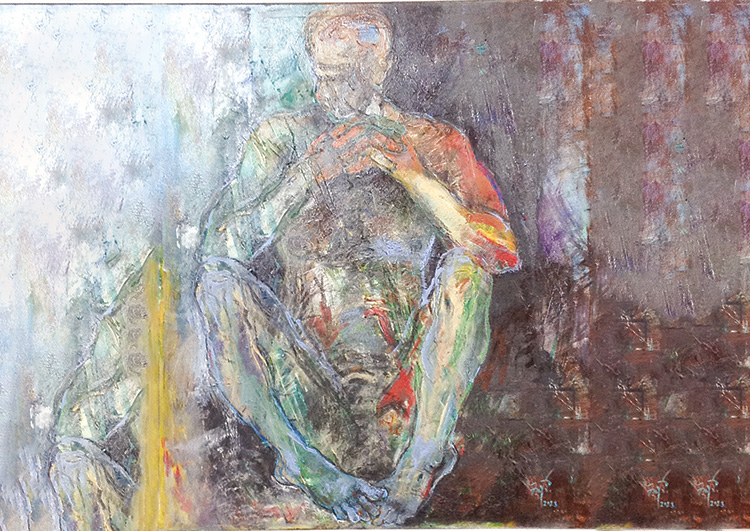
by Laleen Jayamanne
What do the prehensile hand and the big toe have to do with the unique and exalted human ability to think? These two vital anatomical features of our body, the thumb and the big toe, don’t draw attention that much (we take them for granted), but a canonical French sculpture and a small Lankan painting have brought them to my attention recently.
I was predisposed to notice the function of the big toe in Rodin’s modern sculpture, The Thinker (1904) and in Sarath Chandrajeewa’s painting, Thinker in front of the empty doorway (2023), because of a photo of a big toe in the book, Gesture and Speech by the palaeo-anthropologist Andre Leroi-Gourhan. In extreme close-up, it is not a pretty picture, though what Leroi-Gourhan has to say about its function in human evolution is startling, certainly food for thought. He says that the evolution of the human foot with its big toe created the bipedal ability to stand up firmly, and walk upright, without losing balance.
Try walking with the big toe lifted up! Similarly, without the freed prehensile hand, humans could not have evolved to create tools and language, with a big, highly differentiated brain and nervous system of precise sensitivity. He demonstrates the unique refinement of the human hand and foot by providing diagrams of the gradual differentiation of these two drivers of evolution in contrast with some primates. Here’s Leroi-Gourhan:
“The human hand is not fundamentally different from that of other primates. Its ability to grasp, like theirs, is due to an opposable thumb. The foot, however, is radically different from a monkey’s. A primary stage with an opposable big toe is conceivable, but the two paths must have diverged very early, before the earliest known anthropoid stage”.
The Thinker as Archetypal MAN Just imagine placing a woman in the posture of The Thinker. Would it be credible? Sumathy Sivmohan asked this rhetorical question in our recent piece on ‘Abstraction & Empathy’ (Island 19/4/24):
“We already have the figure of the Thinker in Rodin. Do we immediately know to make those connections, and therefore think of the Thinker? Or is it a MAN holding himself in a ‘thoughtful’ pose which kindles the idea?”
So, I did a search and found that there is at least one such example, but its parodic register makes the point. In singer Ariana Grande’s “God Is a Woman” music video, she sits in The Thinker pose while being attacked by small angry men. Rodin’s thinker, though celebrated as a rare modern bronze sculpture, has been parodied in mass culture from as early as 1940. Charly Chaplin parodied The Thinker by placing multiple plaster copies of the statue to decorate the road on which Hinkel’s motorcade travelled in The Great Dictator. He adjusted a detail by making The Thinker stretch out one arm in a ‘Heil Hitler’ salute. Jean Luc Godard parodied The Thinker in his 1968 anti-Vietnam war essay-film, A Letter to Jane. It seemed that the solemnity of this perennial European male posture was unsalvageable.
The Archaic Thinker
But the prototype for the Thinker goes back to ancient times with clay figurines striking the same pose of a seated male figure holding his head in his hand. This iconic gesture (gestus in Brecht, Abhinaya in Mirror of Gesture (Abihnaya Darpan), of resting or holding the weight of the head in his hand with down cast eyes is what makes it an archetypal image of introspective, thinking man, self-aware man. The organ of thought, the brain appears to be weary and heavy, needing support of its ally, the hand. Wikipedia says the following about The Thinker’s archaic lineage:
“The Thinker from Yehud, also known as the Thinker of Palestine,[1] is an archaeological figurine discovered during salvage excavations in the Israeli city of Yehud. The figurine, which sits atop a ceramic jug in a posture resembling Rodin’s famous sculpture “The Thinker,” dates back to the Middle Bronze Age II Palestine (c. 1800–1600 B.C.E.). It was found in a tomb accompanied by various items, including daggers, spearheads, an axe head, a knife, two male sheep, and a donkey, all likely buried as offerings. After its discovery, the broken jug had to be stabilised and restored before being displayed in the Canaanite Galleries of the Israel Museum in Jerusalem.”
“The “Thinker of Cernavodă”, Romania, a terracotta sculpture, and its female counterpart, “The Sitting Woman”, are works of art from the Chalcolithic era. The Hamangia culture produced these remarkable sculptures, with The Thinker believed to be the earliest prehistoric sculpture that conveys human self-reflection instead of the more common artistic themes of hunting or fertility. About 5,000 BC.”
And then Sarath Chandrajeewa does a small painting in 2023 and gives it a discursive title; Thinker in front of the empty doorway, which recollects Rodin’s work respectfully, in that it is not an ‘appropriation,’ neither a copy nor a pastiche of an old master, both tired gestures. But here, the exchange is between two bronze sculptors, one of whom also paints and makes pottery. There is a complex exchange of thought encoded in craft praxis (a theory-practice exchange) going on here, in this act of naming. A rare Lankan practitioner of bronze casting of monumental statues, (trained in the European tradition in Britain and post-Soviet Russia), and of abstract work in bronze, from the global South, salutes a modern European master in an oblique manner, fully cognisant of the vast aesthetic, historical and political differences that separate them. The gesture is quiet, measured, very modest indeed.
The sheer monumental form of Rodin’s Thinker (6 feet), is emphasised by the fact of its placement at a height emphasising the weight of thought bearing down. Besides, seated on a rocky surface he leans forward, twisting his body by placing his right elbow on his left knee, with his hand supporting his head lost in thought. Thinking appears to strain the body to an extreme. The feet rest on an uneven slope creating a sense of a somewhat precarious balance, emphasised by the big toe of his right leg which grips the rocky ground as though to steady himself from slipping.
The Asian Squatting Posture
In contrast, Sarath’s thinker is squatting on the ground and therefore has a stable stance working comfortably with gravity, as all Asian dancers and martial artists also do in their bent-knee stance, while standing. However, the thinker’s right big toe is separated from the little toes and appears to have a life of its own. which is why it stuck out like a sore thumb, as we say in English. The mimetic correspondence between the two thinkers helps to differentiate them on the basis of this similarity. Their big toes sharpen our perception and readies the mind to perceive differences and diverge. This power of divergence, while working within a tradition, is what the late Kumar Shahani called creativity, within Indian Modernism. A contribution to the richness of Indian Modernism which engaged with tradition without reproducing clones and neo-traditionalist kitsch.
‘All that is Solid Melts into Air’ Marx
The high seriousness of Rodin’s The Thinker easily lent itself to parody partly because it is a highly abstract work, free of context, universal. It is in the great lineage of nude sculpture from classical Greece of idealised male figures such as Apollo, to the perfect anatomy of David by Michelangelo. These lessons have been internalised by Rodin who comes at the tail end of this European tradition, after the famous Laocoon of the twisted bodies entangled in a serpentine struggle with a large snake. Rodin’s The Thinker appears belated, an anachronism in the midst of the dematerialisation of space and time in impressionism and other Modernist work of the late 19th Century capitalist, industrial modernity.
Rodin’s model for his The Thinker, ironically, was a boxer who often suffers from brain damage as an occupational hazard! But by then the division between the body (manual labour with the hand) and mind (intellectual labour with the brain) had had a long history in Europe from the Florentine Renaissance on, where the abstract brain work produced Linear Perspective and mapped the globe, as well as the factory system with its division of labour, to produce wool for the market, which required workers with manual skills.
The European Thinker as a Melancholic
It was in this 16th Century tradition that the pathology of Melancholia was written about in Italy, as the signature malady of men who lived by exercising their intellect, that is men of genius, artists, poets and philosophers. In contrast, in classical Greece the thinker was a man who walked and talked, a peripatetic figure as in Plato’s Academy, seen in paintings. Socrates and his students appear to have had a wide repertoire of gestures for picturing thinking as a collective, active process. But it is in the Renaissance that the iconography of the head resting on a hand was revived from prehistoric times to represent a unique male individual as the thinker. Is this because of the immense archive of Classical Greek knowledge that opened up to be mastered, creating the Italian Renaissance?
Thereby in the Renaissance, the thinker as a sedentary, isolated figure of genius became a well-recognised archetype in both the philosophical and medical discourse on Melancholia and also in painting. The German Albrecht Durer, who is the major figure of the Northern Renaissance made the most iconic image of the pathology in his copper engraving, Melancholia 1, (1514). Here the allegorical figure of melancholy is an angel with wings, but in the form of a large woman sitting with her head resting on her hand, in a workshop with craft tools and a geometric form all scattered on the floor unused. His St Jerome in his Study shows the scholar alone in his study at his desk, with a dog, associated with the ‘black dog’ of melancholia. This tradition presents male artists and scholars as being prone to melancholia. They are thought to suffer from a manic-depressive polarity, where creativity of genius flowers when experiencing inspiration or enthusiasm (meaning possessed by divinity), and that very exertion creates the depressive melancholia as well.
The Melancholy Prince of Denmark; ‘To be or not to be …’
With Hamlet as the melancholy prince, the iconography gets theatricalised and dramatic in the sense of being subject to conflicting emotions and moods which give rise to the soring poetry of existential agony and incomparable scenes such as his address to the skull of ‘poor Yorick’ (the Court Jester), at his grave site. The young prince thinks on his feet unlike the older men weighed down by abstract thought.
There is a vast European archive devoted to the pathology of Melancholia. In entering it one risks never returning from it intact. Such are its seductions. So, it’s best to have a brief peek into it and salvage Freud’s essay on ‘Mourning and Melancholia’ which is a very accessible text worth reading. He makes a distinction between mourning and melancholia by saying we mourn the death of a beloved person but the sadness of melancholy is a more generalised, defused feeling of profound emptiness and we are unaware of what it is that we have lost; its unconscious.
Feminists have done some very important work on this pathology of depression (an epidemic in the global North), and have asked why the category of genius has been coded as male. One of the reasons being that gifted women have only rarely had access to the symbolic means to express their profound experiences of loss, sadness and melancholy, unlike men who have had the full range of cultural expression at hand through access to deep education and training.
Ophelia or Portia?
In this force field of Male Melancholia and attendant exceptional classical erudition and creativity of highly gifted men of genius, the figure of Ophelia cuts a sorry picture, no doubt a depressive, given how she is treated by Hamlet, but without the corresponding eloquence of speech, she simply drowns herself in her sadness. In contrast, the clever Portia was a favourite among school girls of my era when there were inter-school Shakespearean competitions where her verbal eloquence, quick wittedness and stirring speech were always on display; ‘The quality of mercy is not strained…’.
Melancholia (Kalpanacari-Thanikam dose hewath Kalakireema?)
Sarath’s ‘Thinker in front of the empty doorway’ is one of the few paintings I was drawn to in his Visual Paraphrases exhibition of 2023 at Barefoot Gallery. And that it was placed next to The Ascetic, (in the catalogue), created a montage, where one noticed the counter-intuitive vibrancy of colour of the Ascetic with primary colours and the disturbingly unruly manner in which the mostly light colours and lines formed the semi-abstract Thinker.
The Ascetic was inviting while the Thinker was sort of disturbing to look at, though I found both compelling in their own way. While the brush strokes abstract the body of the thinker, he is very firmly situated in front of ‘the empty doorway’, a void. The figure is also firmly grounded in his striking squatting position. It’s a class specific posture, though not gender specific, and perhaps it’s also very South Asian, which is easily performed by manual workers, both urban and rural. People of upper classes who do not sit on the ground do not have the muscle strength and flexibility to sit in this manner.
A Void
It’s the incongruity between the title, Thinker…, with its European art history lineage, and the Asiatic squatting posture which struck me at first. The empty doorway is haunting with its yawning void, marked in black, fading to a grey white background with a barely delineated doorpost with the missing door, recalling ‘The’ looted doors and windows of Jaffna during the civil war. Here’s how Sumathy Sivamohan formulates Sarath’s mode of abstraction:
“Sarath’s art is abstract – but they build on the ideas of palpable forms of the real – images of the war that have come to be both tactile and material, like the wood, and have come to stand for the dislocation of war”.
Unlike Rodin’s context free thinker, the melancholy thoughtfulness (kalpanakari-thanikam-dose?) has a social/historical referent presented as a fragment, ‘…the empty doorway’, but abstracted from realist coordinates of place and time. Sumathy identifies a similar dynamic in the abstraction in Fallen Monument where she recognised immediately the scattered fragments of the Jaffna peninsula as her home.
But it’s the rough brush strokes, scrapings and scratching perhaps and the variety of patches of pastel shades of colour mixed with patches of black that emit energy which makes Thinker in front of the empty doorway as alive as The Ascetic but in a more troubling, agitated way, which I guess is what thinking feels like when it does not repeat the same thing over and over, but plunges into a void to find a foot hold, to grip onto something or hang onto something to orient oneself.
The Limits of Realism & Empathy
Had this figure been painted in a realist more empathetic mode, with a sad facial expression say and solid anatomy, its power to create meaning would have been quite different, more limited, I think. What is definitely solid in the painting, though lightly sketched, is ‘The empty doorway’, a fading trace of a violent civil war history, marked with the definite article for emphasis.
In the absence of a realist anatomy to identify with empathetically, one feels a pulsing of the nervous system, suggested by the jostling markings, scribbles, incisions even and colours that don’t ‘complement’ each other. The texture is imperceptible on paper and barely registered on the computer screen, my only forms of access to this painting. The thinker’s bowed, slightly turned head with downcast eyes, rests lightly on his hands with clasped fingers held in front symmetrically, as in a gesture of prayer, elbows resting on the knees, a figure of introspection.
Celestial Blue
A light, radiant, soft, celestial blue patch of colour on the thinker’s head echoes the same colour at the top left-hand corner of the frame and elsewhere on the body including the right big toe, suggesting an outside, out of frame. These qualities of blue appear to lighten the existential gravity of the ‘Thinker in front of the empty doorway’. Here, there is no weighty realist musculature of Rodin’s Thinker to weigh us down with sorrow.
Instead, one feels an energetic, intensive body (expressed with movement-colour somewhat muddied and a variety of markings, abrasions), that makes the beholders minds’ eye restless; perhaps an image of thought under duress. The blue big toe fires a neural connection in the brain of a thinker (an old woman) who thereby dodges the blues.
-

 News6 days ago
News6 days agoBASL in JICA-funded anti-corruption study controversy
-

 Business7 days ago
Business7 days ago‘Dialog Enterprise Partners with UTECH Technologies for Industry 4.0 Transformation’.
-

 Business5 days ago
Business5 days agoSustainable Development Council steps up efforts towards integrated SDG monitoring in Sri Lanka
-

 Features7 days ago
Features7 days agoTeflon Tiran and Visa Outsourcing
-

 News4 days ago
News4 days agoAmnesty International head to join M’vaikkal commemoration
-

 Features7 days ago
Features7 days agoMy aachcho’s jaadi making at Paiyagala
-

 News3 days ago
News3 days agoFashion design teacher arrested for rape
-

 Features6 days ago
Features6 days agoTHE NEXT US CIVIL WAR


